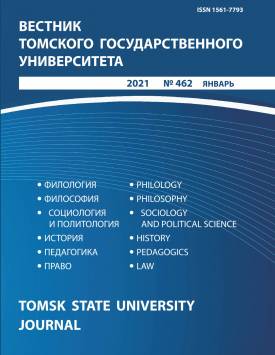Transformational Potential of the Biblical Idiom “A Wolf in Sheep's Clothing” in Modern Russian Speech
The article deals with the defamiliarization of the biblical idiom “a wolf in sheep's clothing” in the modern Russian media reality and speech, and with the transformational potential of this unit. Based on the transformational paradigm of the idiom “a wolf in sheep's clothing” in the horizontal analytical dimension, the article aims to identify the incentives of its transformation (internal phraseological modelling) and formation according to the model (external phraseological modelling), to track its temporal and sociocultural markedness inscribing it into the cultural and ideological context of the newest era, and to reveal the complex of linguistic and non-linguistic factors “provoking” the author of the media text to make the transformational updates which make the contextual (semantic and formal) reinterpretation of the idiom possible. Within the boundaries of the transformational paradigm at the level of its inner and outer vectors, the symbolic meanings of the components and the role of “metaphor of dressing up” in deceitful garments, semantic and structural-semantic transformations (amplification, substitution, implication, double actualization of certain components of the phraseological unit, morphological transformations, deformation of the syntax model, and role inversion), the role of phraseological configuration as an incentive for updating the biblical idiom as well as the facts of phraseological modelling are considered. The article focuses on the heteromorphism of phraseological transformations (semantic, structural-semantic, including morphological ones) with one of the types dominating. Particular attention is paid to both the systemic and non-systemic nature of phraseological transformations and the influence of semantics and pragmatics of the original biblical prototext on the transformative potential of the idiom “a wolf in sheep's clothing”. Following the investigation, it has been found out that the transformative impulses emanating from the semantic and cultural meaning of the original biblical prototext are in demand to a much lesser extent than the linguistic ones (potential of the structural-semantic model of the idiom, symbolic value of its components as well as their systemic connections at the lexical-semantic and grammatical level), which confirms the secularization of the biblical expression and its transition to the category of functional textual units. The study is performed on the material of fiction, Russian printed and electronic media as well as Internet forums and blogs of the beginning of the 21st century. Using the methods of the textual identification of transformations, phraseological modelling, as well as component variable, historical-etymological and linguocultural analysis, the biblical idiom is considered a text-formative element.
Keywords
biblical idiom, defamiliarization, media, Russian speech, phraseological model, transformation, transformational paradigm, internal transformational potential, external transformational potentialAuthors
| Name | Organization | |
| Arkhanhelska Alla M. | Palacký University Olomouc | alla_arkhanhelska@yahoo.com |
References

Transformational Potential of the Biblical Idiom “A Wolf in Sheep's Clothing” in Modern Russian Speech | Vestnik Tomskogo gosudarstvennogo universiteta – Tomsk State University Journal. 2021. № 462. DOI: 10.17223/15617793/462/1
